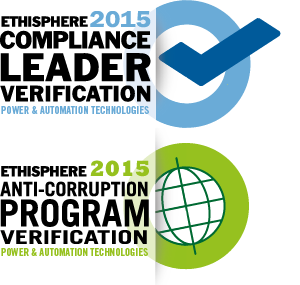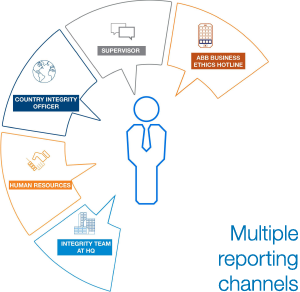Governance and integrity
Embedded in our business values

ABB’s technology makes a major contribution to businesses and communities around the world. However, it is not only what we do, but how we do it that determines our reputation with stakeholders and ensures our continued success.
ABB sets high standards of integrity, which are expected of every employee in every country where we do business. We use a systematic approach, supported by tools and processes, to embed integrity in the organization and apply a zero tolerance policy for violations.
Standards of business conduct
ABB’s approach to integrity is based on a clear set of values and strong communication from top leadership – to our employees and also to our business partners. These values and expectations are described in our Code of Conduct and Supplier Code of Conduct, which are underpinned by a robust set of internal standards and policies.
Our integrity policies reflect the importance of individual accountability, oversight, integrity leadership and transparency. These policies include the prohibition of facilitation payments, zero tolerance of any involvement in bribery or corruption, robust policies on gifts, entertainment, and expenses, political and charitable contributions and external representatives, and measures to ensure ethical supply chains. The key elements of our integrity standards and policies are available on our website.
To take account of changes in the external environment and our own organization, ABB regularly reviews these standards to ensure continued relevance and effectiveness.

employees trained on anti-bribery principles in 2014 and 2015
Prevention: educating and empowering our employees
ABB’s integrity program is based on three pillars: prevention, detection and resolution. Our primary focus for all employees is on training and communication, which are key to ensure that ABB’s values are understood and to prevent non-compliant behavior.
Within three months of joining, every new ABB employee must complete online e-learning and face-to-face training on the ABB Code of Conduct. This training is refreshed/updated for all employees on a two-year cycle. In addition, employees in sensitive roles receive specialized online and face-to-face trainings for specific integrity risk subjects.
Country integrity training plans are developed annually, based on the global ABB Group requirements, as well as local integrity risk topics. Local risks are identified through audits, investigations and integrity program implementation reviews. Country Integrity Officers are required to conduct these implementation reviews every six months to assess their status related to a defined set of risk subjects. Results of these reviews provide input to the further development of both local and Group integrity initiatives.
Additionally, all agents and representatives acting on behalf of ABB must participate in mandatory e-learning or face-to-face integrity training.
In 2014 and 2015, more than 96,000 ABB white collar employees (97 percent) completed the Global Anti-Bribery: Don’t Look the Other Way online training, while approximately 97 percent of blue collar employees completed face-to-face training on ABB’s Code of Conduct. A new two year anti-bribery training campaign will be launched in 2016.
During the year, we piloted a new cloud-based tool for pre-approval of gifts, entertainment and expenses that will enable us to provide globally consistent review and transparent advice for our employees. Roll-out will commence in 2016, supported by on-demand training and standard documentation.
Detection
ABB also maintains additional initiatives to prevent non-compliant behavior and to detect integrity concerns. Anti-bribery reviews of business units and countries are conducted throughout the year by ABB’s internal audit department. In these reviews, the auditors review business processes, accounts and balances, and test transactions to assess the robustness of controls and identify possible violations of ABB’s anti-bribery procedures. Our anti-fraud program is also monitored by internal audit who regularly evaluate fraud risk exposure and developing trends.
Multiple channels are available to all employees to report integrity concerns, including a multi-lingual business ethics hotline run by a third party, which is available 24 hours a day, seven days a week. The different reporting channels are advertised through a hotline poster campaign, which was updated at the beginning of 2015. Whistleblowers are promised protection from retaliation. A stakeholder hotline is available to our external business partners, with details available on our website.
Resolution: zero tolerance for violations
ABB enforces a strict zero tolerance policy for violations of the law or the ABB Code of Conduct, and we take the appropriate disciplinary action – including termination of employment – against employees who violate them.
The Office of Special Investigations (OSI), part of ABB’s Legal and Integrity team, is responsible for conducting investigations globally. Reported integrity concerns are handled by OSI and are brought to closure through investigation and remediation. Where disciplinary action is required, the process is governed by ABB’s Human Resources Disciplinary Protocol and administered by Human Resources Disciplinary Committees at headquarters and in the regions.
While we are confident of the robustness of our integrity training and processes, we continuously consider ongoing improvements. During 2015, there were not any substantiated corruption cases. The company did not face any significant fines or sanctions for non-compliance with laws and regulations in 2015. For further information, please refer to the Commitments and contingencies note in the Notes to the Consolidated Financial Statements contained in the ABB Group Annual Report.
Engagement and external recognition

ABB also supports international efforts such as collective action and projects aimed at promoting integrity in the industries where we work and in the public sector. We are a founding member of the Partnering Against Corruption Initiative and also became a founding member in 2014 of Ethics and Compliance Switzerland. This engagement enables ABB to develop and contribute to the overall development of systematic values and integrity in various organizations throughout Switzerland and abroad.
ABB’s integrity program has been benchmarked and recognized externally. In 2015, we received the Ethisphere Compliance Leader Verification and Anti-Corruption Program Verification seals based on a review of our integrity program by NYSE Governance Services. For the third consecutive year, we were also recognized as one of the World’s Most Ethical Companies.
Risk management
In addition to the risk identification processes conducted by the Internal Audit and the Legal and Integrity departments, ABB maintains a global integrated and Group-wide risk management process. Once a year, the executive management and the Board of Directors perform a risk assessment in accordance with the company’s risk management processes and take appropriate actions where necessary.
ABB takes a comprehensive top-down and bottom-up approach to Enterprise Risk Management (ERM), which directly involves all ABB Group functions, regions, divisions and the majority of ABB’s country organizations and global business units.
The ERM process is supported by a common ABB risk catalogue and training sessions for the participating entities. The common risk catalogue covers a wide range of issues including external, finance, organizational, people, cultural and operational risks, as well as issues related to the legislative environment, climate change and cyber security.
The participating entities organize ERM roundtables where top risks are identified, assessed and reported along with a detailed risk description, the likelihood of such risks occurring, the potential impact on profitability, and respective mitigation plans. Participating entities also report key performance indicators that they will use to measure their progress on mitigating the risk and reflect on their risk profile in 12 months (residual risks).
The risk management approaches of Group ERM and Internal Audit are aligned. The current and residual risks are consolidated and analyzed at a Group level by the Group ERM team and discussed at the Group ERM roundtable, which involves senior managers from different parts of the Group, including the sustainability function.
ABB is now integrating in one platform all financial, non-financial and internal audit risks and risk-mitigating actions to enable closer monitoring of all risk-mitigating actions in the countries and business units.
In addition to the ERM process, ABB’s Insurance Risk Management function works closely with our global insurance providers to identify global risks and to assess the relative risks to our assets and operations. All facilities are required to develop, implement and test business continuity and crisis preparedness plans, and security and crisis management exercises are carried out in all regions.
The ongoing instability around the world and emergence of different types of challenges underline the value of good risk management in contributing to an agile and resilient organization.
